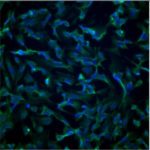Lien vers Pubmed [PMID] – 30366254
Eur J Med Chem 2019 Jan;161:277-291
Despite the recent reductions in the global burden of malaria, this disease remains a devastating cause of death in tropical and subtropical regions. As there is no broadly effective vaccine for malaria, prevention and treatment still rely on chemotherapy. Unfortunately, emerging resistance to the gold standard artemisinin combination therapies means that new drugs with novel modes of action are urgently needed. In this context, Plasmodium histone modifying enzymes have emerged as potential drug targets, prompting us to develop and optimize compounds directed against such epigenetic targets. A panel of 51 compounds designed to target different epigenetic enzymes were screened for activity against Plasmodium falciparum parasites. Based on in vitro activity against drug susceptible and drug-resistant P. falciparum lines, selectivity index criterion and favorable pharmacokinetic properties, four compounds, one HDAC inhibitor (1) and three DNMT inhibitors (37, 43 and 45), were selected for preclinical studies in a mouse model of malaria. In vivo data showed that 37, 43 and 45 exhibited oral efficacy in the mouse model of Plasmodium berghei infection. These compounds represent promising starting points for the development of novel antimalarial drugs.

